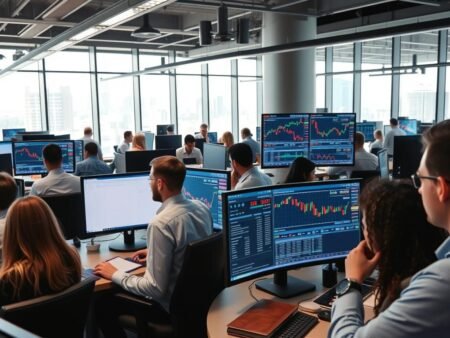In the fast-paced world of finance, the idea of a proprietary trading career is very tempting. It promises high stakes and rewards. But, what does it really mean to enter this competitive world?
At the core of this question is the dream of financial success. Could using a firm’s resources boost your success? Or does it limit your potential to someone else’s strategy? In our deep dive into prop trading, we find prop trading insights that could change your trading career benefits.
Choosing between going solo or joining a prestigious prop firm is a big decision. We look at success rates and potential earnings that traders dream of. Does a prop firm’s structure help you reach the top of trading, or does it hold you back?
Key Takeaways
- Insights into the reality of a proprietary trading career versus independent trading.
- Evaluation of prop trading as a financially viable career option.
- Analysis of how prop firms may influence a trader’s growth and potential earnings.
- Understanding the role of real-world statistics in assessing the success of prop traders.
- Comparison of the structured environment of a firm with the freedom of solo trading endeavors.
Understanding Proprietary Trading Firms
In the fast-paced world of finance, proprietary trading firms are unique. They navigate market ups and downs to find big opportunities. These firms are key in shaping financial strategies, offering special services that set them apart from traditional investment houses.
Defining a Proprietary Trading Firm
A proprietary trading firm, or ‘prop firm’, works differently than others. They use their own money to make profits, unlike hedge funds that manage client money. They use advanced trading strategies to make quick profits.
Services Offered by Prop Firms
Prop firms provide a range of services to make money in the market. They execute lots of trades and offer liquidity and stable prices. They also find and exploit price differences between markets, helping the market work better.
How Prop Firms Operate in the Financial Markets
At the heart of prop firms is quick and smart trading. They use the latest technology and data to make fast decisions. They also manage risks carefully to avoid big losses while chasing profits.
The table below shows the different strategies prop firms use. It highlights their diverse operations and strategic choices:
| Strategy Type | Objective | Execution Method |
|---|---|---|
| Market Making | Provide liquidity, stabilize market prices | High-frequency, automated algorithms |
| Arbitrage | Profit from price differentials across markets | Synchronized, multi-market trades |
| Global Macro Strategies | Capitalize on economic events impacting global markets | Long-term positions based on comprehensive macroeconomic analysis |
| Event-Driven Strategies | Profit from event-based scenarios | Mixture of algorithmic and manual trading around events |
Through these specialized strategies, prop firms boost their profits. They also help make the financial markets more liquid and healthy. This shows their important role in the financial world.
Prop Trading Benefits: What’s in It for You?
Prop trading offers unique prop trading advantages for those aiming to grow in finance. This part explains the benefits you can get as a pro in this field.
Working with a prop trading firm gives you access to significant investment capital. This is more than you could manage on your own. It lets you take bigger risks or try different strategies, which can lead to bigger profits.
Prop firms also have the latest technology and trading software. These tools are key in today’s fast-changing markets. They offer real-time data, advanced analytics, and automated systems. These tools are crucial for the professional trader benefits.
- Immediate access to high-end trading platforms
- Real-time analytics to make informed decisions
- Collaborative environment with seasoned traders
The trading career rewards in prop trading go beyond just money. Many firms offer a supportive environment where new traders can learn from experienced ones. This community and learning aspect are key to quick learning and career growth.
| Benefit | Description |
|---|---|
| Capital Access | Traders access more extensive capital, facilitating larger trades than possible if trading independently. |
| Advanced Technologies | Usage of advanced trading platforms and analytical tools that predict market trends and optimize trades. |
| Mentorship Opportunities | Guidance and insights from experts within the firm that aid skill development and strategic trading. |
| Networking | Being part of a trading team helps in building valuable industry contacts, enhancing career opportunities. |
In summary, prop trading offers many benefits. These include big financial resources, the latest technology, and chances for growth and learning. For ambitious traders, moving to prop trading is a big step towards success.
The Risks Involved with Prop Trading
Proprietary trading offers big chances but comes with risks. Traders need to be careful. Knowing these risks is key for those thinking about prop trading.
Evaluating the Financial Risks
One big worry in proprietary trading is trading financial liabilities. Traders could lose a lot of money. This could hurt their career and personal finances.
Markets change fast. So, managing risks well is very important for traders.
The Pressure of Performance Benchmarks
Performance stress in trading is high, especially in prop trading firms. They set high goals for traders. Traders must not only meet but beat market returns.
This creates a lot of pressure. It demands traders to perform at their best all the time.
Potential Regulatory Challenges
Regulatory compliance is a big deal for prop traders. Financial laws are complex and keep changing. Traders must keep up and follow new rules to avoid legal trouble.
“Is Trading for a Prop Firm Worth It?” – Weighing Pros and Cons
Thinking about a career in trading analysis at a proprietary trading firm? You need to weigh the good and bad sides. This means doing a deep prop trading evaluation and understanding trading firm decision-making. We’ll look at these points to help you decide.
- Pros of Trading for a Prop Firm:
- Access to lots of capital
- Use of the latest trading tech and strategies
- Chance for big profits and quick career moves
- Cons of Trading for a Prop Firm:
- Risk of big financial losses, thanks to firm leverage
- High stress and high expectations
- Dependence on market ups and downs
Choosing to start or keep a career in trading analysis at a proprietary trading firm is big. It depends on how much risk you can handle and what you want from your career. Prop trading is exciting and can pay off well, but it’s also risky. You need to think carefully before jumping in.
| Aspect | Advantages | Disadvantages |
|---|---|---|
| Capital Access | Big initial capital, no personal money needed | Losses could be more than your money |
| Technology and Training | Top trading tools and training | Can be too much and very technical |
| Career Growth | Fast career growth and money | Success depends on the market, which is unpredictable |
| Market Dependency | Chance to make money from market gains | Very sensitive to market downturns |

In conclusion, the choice to do prop trading evaluation and join a trading firm depends on your financial risk tolerance. It’s key to match your personal and professional goals with the unpredictable nature of trading markets. A thorough assessment of your goals is essential when making trading firm decision-making in the fast-paced world of proprietary trading.
What Makes Prop Trading Attractive to Traders?
Prop trading is very appealing to those in finance. It offers unique opportunities and benefits. Traders get to use top-notch tools and have a chance to grow both personally and professionally.
Access to Advanced Trading Tools
Prop trading firms give traders access to advanced tools. This is a big difference from regular traders. They get to use the best market data, software, and algorithms.
This tech helps traders do complex strategies well. It makes their trading better and more efficient.
Opportunities for Professional Growth
Trader career growth is key for prop firms. They invest in their traders’ development. They offer mentorship, workshops, and training in new strategies.
This culture of learning improves traders’ skills. It also creates a place where everyone can grow.
Leveraging Firm’s Capital: A Double-Edged Sword?
Working at a prop firm means using a lot of capital. This can lead to bigger profits. But, it also means bigger risks.
Traders need to be disciplined and know how to manage risks. Big losses are possible, but so are big wins.
Prop trading is attractive for many reasons. It offers advanced tools, growth opportunities, and big financial resources. These things draw in dedicated traders who want to earn and grow.
Prop Trading Opportunities: Exploring Career Advancement
Looking into the prop firm career ladder opens up many trading career opportunities. These opportunities fit different skill levels and goals. As traders move up, they follow plans that help them grow their skills and knowledge.
At the start, traders do smaller trades with close guidance. As they get better and more reliable, they take on bigger tasks. Moving up to senior trader, then to a portfolio manager, or even a partner shows the many paths to success in proprietary trading firms.
- Entry-Level Trader – Learning the basics under guidance.
- Senior Trader – Handling bigger trades and strategies.
- Risk Manager – Watching over trading risks and making sure rules are followed.
- Portfolio Manager – Looking after big portfolios and talking to clients.
- Partner/Director – Leading the firm’s strategy and growth.
The details of prop trading progression can change a lot between firms. Some prop firms even help pay for advanced certifications and education in finance and market analysis.
| Career Stage | Typical Responsibilities | Expected Skills Development |
|---|---|---|
| Entry-Level Trader | Executing basic trades, learning software tools | Trade execution, basic risk management |
| Senior Trader | Developing strategies, managing a segment of the trading floor | Advanced trading strategies, leadership |
| Risk Manager | Monitoring firm-wide risk exposure, compliance checks | Risk assessment, regulatory knowledge |
| Portfolio Manager | Direct client interaction, managing major accounts | Client management, holistic market understanding |
| Partner/Director | Strategic firm decisions, expansion planning | Business acumen, strategic planning |
Knowing the prop firm career ladder helps traders plan their careers well. They can set goals and get more education and training for bigger roles.
Evaluating Prop Trading Job Requirements
Starting a career in proprietary trading needs a mix of skills and traits. These are key to doing well in this fast-paced and tough field. We’ll look at the main qualifications, education, and mental toughness needed for success in prop trading.
Essential Skills for Success
At the heart of good proprietary trading are important skills. Traders need strong analytical thinking to understand market data and economic reports. They must also make quick decisions to take advantage of market changes.
Being adaptable is crucial because the financial markets are always changing. These skills not only improve a trader’s qualifications but also help them handle complex trading situations.
Education and Background Preferred by Prop Firms
Prop firms usually want candidates with a finance, business, or economics background. Knowing about financial instruments and markets is key. Also, experience with statistical tools and trading platforms is valued.
Having a Chartered Financial Analyst certification can be a big plus.
Mental Fortitude and Disciplinary Standards
Prop trading is high-pressure, so trader psychological endurance is very important. Traders need to stay strong during market ups and downs. They must also stick to their trading plans, not letting emotions get in the way.
Being able to bounce back from losses and consistently manage risks shows a trader’s ability to succeed over time.
Knowing these requirements is key for those wanting to join top prop trading firms like those on this resource. A mix of education, practical skills, and mental toughness is the base of a successful prop trading career.
| Qualification | Details | Importance |
|---|---|---|
| Formal Education | Finance, Economics, or related field | High |
| Technical Skills | Statistical tools, Trading platforms | Medium |
| Pyschological Endurance | Stress tolerance, Discipline | Essential |
Real-Life Prop Trading Success Stories
Looking at real-life examples of successful traders can really help us understand the world of proprietary trading. These stories show us what’s possible and inspire new traders to follow in their footsteps.
Learning from Successful Prop Traders
Successful prop traders know a lot about the markets, stay disciplined, and grab opportunities when they can. By studying their careers, we get a deep look into what it takes to succeed in finance.
How Success Stories Can Inspire Potential Prop Traders
Inspirational trading careers are more than just tales of success. They show us what’s achievable in proprietary trading. New traders find motivation in these stories, using the strategies and insights to improve their own trading.
| Trader | Years in Trading | Specialization | Notable Achievements |
|---|---|---|---|
| Michael S. | 10 | Equities | Consistently exceeded firm’s annual ROI target |
| Lisa Q. | 7 | Foreign Exchange | Developed proprietary algorithms for FX forecasting |
| Aaron B. | 12 | Commodities | Pioneered an innovative approach to commodity hedging |
Every story is unique, with its own challenges and victories. They show how important personal skills and understanding the market are for success. These stories are key for new traders, guiding them through the complex world of finance with a clear path to follow.
Navigating the Prop Trading Firm Comparison
Choosing the right firm in proprietary trading is key to your success. Comparing prop firms means looking at many things. You need to find a firm that matches your trading style and goals. Important factors include reputation, technology, support, culture, and how you get paid.
First, check the firm’s reputation and past success. A respected firm can boost your career and offer a solid trading platform. Next, look at the technology. Different firms offer different tools and platforms, so choose wisely.
Support systems like mentoring and training are important. They show if the firm cares about your growth. Also, think about the culture. A firm that fits your values can make you happier and more productive. Finally, consider how you’ll be paid. It affects your earnings and motivation.
| Criteria | Importance | Details to Consider |
|---|---|---|
| Reputation | High | Years in business, success stories, regulatory standing |
| Technology | High | Trading platforms, analytical tools, infrastructure |
| Support | Medium | Training programs, mentoring, trader resources |
| Culture | Medium | Company values, work environment, peer relationships |
| Compensation | High | Profit sharing, commissions, bonuses |
By carefully comparing prop firms, you can choose one that improves your trading and fits your career goals.
Expert Insights into the Prop Trading Industry
In the world of proprietary trading, knowing the market trends and strategies is key. Prop trading futurology helps by giving precise predictions and forecasts. These are vital for dealing with market ups and downs.
Current Trends and Future Projections
The prop trading world is changing fast, thanks to new tech like machine learning and algorithmic trading. These tools help in market trend analysis, making decisions more accurate. Looking forward, prop trading futurology sees more automation and smarter trading algorithms.
Industry Expert Opinions and Predictions
Top traders say it’s crucial to keep up with tech to get the best insights. They believe a more strategy-focused approach will soon lead the way in prop trading. This will help reduce the uncertainty often found in financial markets.
| Technology | Current Impact | Future Projection |
|---|---|---|
| AI and Machine Learning | Enhanced data analytics | Core drivers of trading decisions |
| Blockchain Technology | Emerging implementation | Expected to revolutionize trade security |
| Quantitative Analysis | Decision support systems | Integral to trading efficacy |
Prop Trading Risks: Navigating Market Volatility
In the world of proprietary trading, it’s key to grasp the market volatility impact and have strong prop trading risk control strategies. Both traders and firms must keep updating their trading strategy adaptation to keep up with the fast-changing markets.
Understanding the Impact of Market Swings
Market volatility can greatly affect a prop trading firm’s operations. It impacts profits and losses and also the stress on traders. Big market shifts can lead to quick, possibly wrong decisions, hurting trading strategies. So, staying calm and knowing market signs well is very important.
Risk Management Strategies for Prop Traders
Good risk management is key to protecting a trader’s portfolio in unexpected market situations. Techniques like stop-loss orders and hedging are vital. Also, using tech for quick analytics helps traders make better choices and adjust strategies.
The table below shows some top strategies prop traders use to manage risks:
| Strategy | Description | Benefit |
|---|---|---|
| Stop-Loss Orders | Automated sell orders triggered by certain price levels. | Limits potential losses. |
| Portfolio Diversification | Spreading investments across various financial instruments. | Reduces the impact of a single asset’s volatility. |
| Hedging | Investing in opposite positions to mitigate risks. | Protects against adverse price movements. |
For prop trading success in volatile times, you need a mix of sharp market insight, tech tools, and tested risk management. It’s a journey of learning, staying alert, adaptable, and forward-thinking.
Is There a Future for Prop Trading in Modern Finance?
Looking into the future of trading firms means checking out key areas. These include how they fit into changing finance industry trends. Proprietary trading, or prop trading, is at a turning point. This is due to new tech, rules, and market changes.

The talk about prop trading sustainability is very important now. It’s not just about making money anymore. It’s about keeping up with new tech and rules that shape today’s markets. Several things are affecting how well prop trading can keep up:
- Technological advancements: Automation and AI are changing how trades are made and strategies are created.
- Regulatory considerations: Firms face more rules and checks, so they need to be ready to change fast.
- Market Conditions: Changes in the world economy affect how easy it is to trade and how much things move.
Analytical Insights into Prop Trading’s Adaptability
| Aspect | Impact on Prop Trading | Future Implications |
|---|---|---|
| Technological Adoption | Helps with better analysis and quicker trades. | Means always needing the latest tech. |
| Regulatory Compliance | Requires strong plans for managing risks and following rules. | Means always keeping up with global financial laws. |
| Economic Environment | Shapes strategies based on big economic factors. | Means being quick to adjust to economic ups and downs to keep growing. |
Looking ahead, the future of trading firms will depend a lot on being quick and ready for new tech and rules. The talk about prop trading sustainability shows how important it is to think ahead and be flexible. This is key to staying ahead in a fast-changing finance world.
Creating a Balanced Prop Trading Career Path
In the fast-paced world of proprietary trading, a sustainable trading career depends on solid career growth strategies and a good prop trading life balance. This balance boosts job happiness and leads to lasting success in a competitive field.
Strategies for Long-term Growth within a Prop Firm
To thrive in prop trading, you need more than just market smarts and trading skills. It’s about planning and learning to keep up with the financial world’s changes. Here are key strategies for a sustainable trading career in a prop firm:
- Continual Learning: Keep up with market trends and new tech through training and courses.
- Mentorship: Get advice from seasoned traders who know the ropes.
- Performance Evaluation: Check your trading often to see what’s working and what’s not.
- Risk Management: Use strict risk rules to avoid big losses and keep your career safe.
Maintaining Work-Life Balance as a Prop Trader
It’s vital to balance work and personal life for your health and performance. Here’s how to keep a prop trading life balance:
- Clear boundaries: Stick to set work hours to avoid burnout.
- Breaks and Downtime: Make time for breaks and rest to recharge.
- Physical Activity: Stay active to boost health and focus.
- Prioritization: Manage your time well to meet work and personal goals.
| Aspect | Strategy | Benefits |
|---|---|---|
| Learning and Development | Continual professional education | Keeps skills sharp and relevant |
| Mentorship | Regular sessions with experienced traders | Provides personalized insights and strategies |
| Risk Management | Implement advanced risk protocols | Minimizes losses and protects profits |
| Work-Life Balance | Structured work hours and breaks | Promotes mental well-being and sustains performance |
Final Thoughts on Trading for a Proprietary Firm
This journey into proprietary trading has shown its many sides. We’ve seen the good and the tough parts of this career. In this prop trading final analysis, we find that it’s rewarding for those who can handle the pressure. But, the risks, competition, and high expectations are important to remember.
Choosing a career is all about weighing the good and the bad. Prop trading lets you make big trades but also risks big losses. The chance to grow and learn new things is a big plus. Success in prop trading means balancing your goals with careful risk-taking.
This isn’t about giving a yes or no answer. It’s about giving you all the facts to make a smart choice. Whether you’re new or experienced, knowing the ins and outs of prop trading is key. Now, you can make decisions with a clear understanding of what prop trading is all about.












